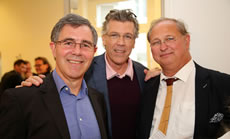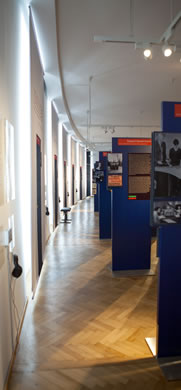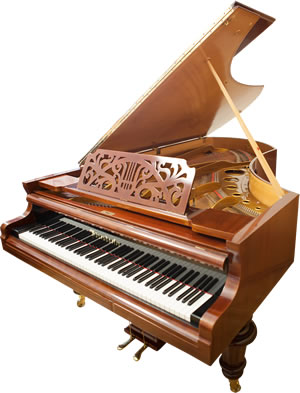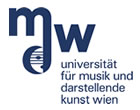| EXHIBITION of the exil.arte Center at the mdw |
Please find our current
opening hours at
www.exilarte.org >
Guided tours
(also for student groups)
on request:
info@exilarte.at
Free admission! |
University of Music and Performing Arts, Vienna
Lothringerstraße 18 / A0116 1030 Wien
The exil.arte Center extends its Exhibition
“I return to Vienna when I compose”
with further estates
Theo Buchwald
Robert Freistadtl
Wilhelm Grosz
André Singer
Jan Urban
Hans Winterberg
and with a
Special Exhibition Gedenkjahre 1918, 1933, 1938
„Das Wort entschlief, als jene Welt erwachte“
(Karl Kraus, 1933)
|

Panorama photos from the development of the exhibition |

Exhibition visitors |
 |
 |
The exil.arte Center of the mdw is situated in exactly the same building where talented musicians studied and pioneering lecturers taught. Between 1933 and 1938, many of the mdw’s most gifted individuals were forced to flee the Nazi terror. Some managed to continue their careers, while others found they had lost the very foundations of their work. An entire generation of younger musicians was deprived by this cultural catastrophe of ever being admitted to the mdw. The first exhibition opening the newly founded exil.arte Center at the mdw focuses on the lost musical legacy and the fates of these many and diverse lives.
|
- The first Jew to join the Vienna’s Boys’ Choir; studied at the mdw and later in exile worked as a farmer in New Zealand before becoming one of Bruckner’s greatest interpreters, working solely with provincial orchestras which until his recordings were released were largely unknown: – Georg Tintner
- A student at the mdw, subsequently deported by the Nazis yet managed to escape from both Dachau and Buchenwald. In exile he later founded both the Manila Symphony Orchestra and the Brooklyn Symphony Orchestra. He remained an active pedagogue in the Far East while at the same time working as Projects’ Director at UCLA. – Herbert Zipper
- Studied at the mdw, performed with her father, leader of one of the most renowned quartets and concert masters of the Vienna Philharmonic. Exiled to England following the dismissal of her father, she returned to the continent as their only means of support before her arrest and subsequent death at Auschwitz, where nevertheless, she survived long enough to conduct and manage the all-women orchestra – Alma Rosé
- Excluded from his high school as a Jew and unable even to apply for a place at the mdw he fled to the United States, where he became a music critic for the Los Angeles Times; founded and directed the music department at Loyola Marymount University while composing in private. His compositions have only recently come to light with the release of 6 CDs. He continues to live and work in Los Angeles as a youthful 97 year old. – Walter Arlen
- Also excluded from high school and unable to audition for the mdw; exile to the United States meant leaving Nazi Vienna and his first love who fled to Switzerland. Following a successful career as an accountant, he returned to composition only after being reunited with his lost girlfriend some forty years later. – Robert Fürstenthal
- A child prodigy, and a world renowned composer, he taught at the mdw for a short time. In American exile, he reluctantly saw his only means of survival as that of Hollywood composer, where his work resulted in such a fundamental paradigm shift that following his departure from the studios, his main output would be dismissed as “movie music”. His natural musical idiom perfectly matched the needs of American high-emotion cinema. This meant that movie music actually sounded like him, not the other way around – Erich Wolfgang Korngold
Only some of the over 50 different stories are told at the exhibition “I return to Vienna when I compose”
|

Walk through the exhibition |
The Emmy and Egon Wellesz Piano
Emmy Wellesz, née Stross
(1889, Vienna – 1987, Vienna)
Art historian specialized in Byzantine studies,
doctorate awarded in 1921
Egon Wellesz
(1885, Vienna – 1974, Oxford)
Composer and musicologist, specialized in
early music, new music, byzantine neumes,
doctorate awarded in 1908
Bösendorfer grand piano
(225 cm) “Mahogany Model 4”
built November 1908 – February 1909
sales number 18913 (serial number 10081).
Bought as a “wedding present” by Emmy’s father, Councilor of Commerce Ludwig Stross, of Ebendorferstrasse 8 in Vienna’s 1st district.
|  |
- Location until 1938: Kaasgraben artists’ colony (Kaasgraben 36-38 in Vienna’s 19th district, built by Josef Hoffmann)
- July 1938: emigration to Oxford with daughters Magda (1909-2006) and Elisabeth (1912-1995); Egon Wellesz is appointed to a professorship in Oxford
- Sale of the piano to Les Thompson, music teacher and student of Egon Wellesz. The relationship with Les Thompson was very close – Emmy told his wife, Marjorie, that she and Egon saw in Les the son they never had. Following his stroke, Egon would only see Emmy and Les, while Egon and Les even still sang operas together (Egon could no longer speak but was still able to sing)
- Rachel Thompson, the daughter of Les, brought the piano to London to be auctioned by Piano Auctions Ltd. on 7 April 2016
- Tipped off about the sale by Tanya Tintner, Gerold Gruber appeals to Rachel Thompson to sell the piano to the mdw rather than auction it – which ultimately results in the piano being removed from the auction
- March 2016: the exil.arte Center of the mdw buys the piano
- June 2016: G&R Removals transports the instrument back to Vienna
- February 2017: the piano is restored by Gert Hecher
- May 2017: the Wellesz piano is presented for the first time as part of the exhibition “I return to Vienna when I compose” at the mdw’s exil.arte Center
|
www.mdw.ac.at/exil.arte

|
 |

|
| |
 |
 |
 |
|

















